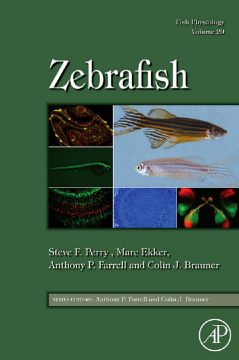
BOOK
Fish Physiology: Zebrafish
Steve F. Perry | Marc Ekker | Anthony P. Farrell | Colin J. Brauner
(2010)
Additional Information
Book Details
Abstract
This cutting-edge resource includes up-to-date information on zebrafish physiology and the tools used to study it, not only as a model species for studies of other vertebrates but with application for studies of human disease and aquatic toxicology. The utility of zebrafish for physiological research is based on several key features including i) a "fully" sequenced genome, ii) rapid (~3 month) generation times), iii) their capacity to produce large numbers of externally fertilized eggs, iv) optical transparency of embryos and larvae, and v) the applicability of reverse and forward genetics to assess gene function. Gene knockdown in embryos and the production of transgenic strains are now standard techniques being used to assess physiology. This book will be of keen interest not only to the typical readers of Fish Physiology but also to biomedical researchers, toxicologists and developmental biologists.
- Integrates and synthesizes the biology of the zebrafish under one cover
- Features contributions from the leading researchers in their fields
- Reaches a wider audience of researchers and biologists with its broad inclusion of subjects relating to zebrafish physiology
"This cutting-edge resource includes up-to-date information on zebrafish physiology and the tools used to study it… This book will be of keen interest not only to the typical readers of Fish Physiology but also to biomedical researchers, toxicologists an developmental biologists." --GrrlScientist’s Maniraptora blog on Nature.com
